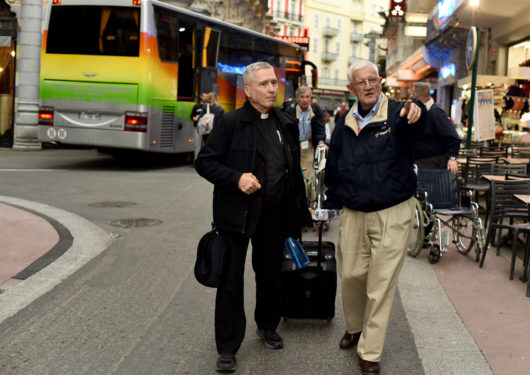By Christopher White, The Tablet’s National Correspondent

PARIS, France – While the Marian site of Lourdes has long been a popular pilgrimage destination for those seeking healing, as 15,000 soldiers gather there this week for the 60th anniversary International Military Pilgrimage, it will transform into “the world capital of prayer for peace.”
According to Bishop Antoine de Romanet, head of the Diocese of the French Armed Forces, the pilgrimage, with this year’s theme of “Peace on Earth,” will be defined first and foremost by prayer, but also music, young people, and beer – these are soldiers, after all.
Sixty years ago, in the aftermath of World War II, an inaugural pilgrimage was organized to Lourdes with the primary goal of improving relations between French and German soldiers.
“The main idea is that we absolutely had to build peace, to build relationships, and to consider that we have the same father, that we are brothers,” said Bishop Romanet on the eve of this year’s pilgrimage. “You have to create links and personal relations in a spiritual context.”
The pilgrimage enjoys the official support of the French army, making it a “high event” for the country, attracting some of the military’s top brass.
Yet, while the event began as primarily a European project, today it has grown to include participants from all over the world. This year, more than 200 active and retired U.S. military personnel are being sponsored by the Knights of Columbus to join in the pilgrimage.
In a message to pilgrims ahead of the occasion, Archbishop Timothy Broglio, head of the U.S. Military Services Archdiocese, urged prayers “for progress in international dialogue, welcome for the immigrant, and a decrease in violence in our communities and the world.”
Many of the U.S. participants are wounded warriors who are traveling to Lourdes seeking physical and spiritual healing.
Father Mark Bristol, a priest of the Brooklyn Diocese and U.S. Navy veteran, is accompanying a delegation of Wounded Warriors.
In addition to the colorful uniforms and a mix of music from participating countries, Bishop Romanet described a moving scene of individuals with lost limbs, including that of suffering young soldiers who have been wounded in service.
He explained that France has one of the youngest armies in Europe, recruiting 25,000 new military personnel each year from the ages of 18 to 28.
This year’s pilgrimage will have special significance to soldiers, as it takes place in the shadow of the death of Colonel Arnaud Beltrame. In March, Beltrame took the place of a young woman being held hostage by terrorists in Trèbes, France, and sacrificed his own life on her behalf.
In the aftermath of Beltrame’s brutal death, he has become an icon of heroism in France and beyond.
Beltrame was an adult convert to Catholicism, and according to Bishop Romanet, “He will stay a very long time an incredible symbol of light versus darkness.”
“He knew very well, that terrorists would kill a solider with less hesitation than killing a young lady,” said Bishop Romanet. “He truly engaged his life to protect the life of someone else.”
The French Church has had a military chaplaincy since the time of Charlemagne in the eighth century, and as Bishop Romanet notes, it’s almost inseparable from the idea of military service.
“The question of life and death is present all the time for soldiers. If you don’t have the consideration of the spiritual life and eternal life, then how will people know what they are giving their lives for?” Bishop Romanet asks.
“If you remove that dimension, how could you ask 25,000 guys every year to dedicate their lives in service of a country?” he continued.
The prelate observed that in the Catholic Church there are many specific gatherings for various groups of people, from lay movement celebrations to World Youth Days and the World Meetings of Families, and he sees the International Military Pilgrimage in that same vein.
Lourdes, according to the bishop, has been “a place of conversion for so many,” and he believes that even for Catholic military personnel that have fallen away from the faith, that this will be an occasion to rediscover their roots.
“It’s exactly the way in which Pope Francis invites us to be at the peripheries,” he said. “There are so many people who are not practicing Catholics, but they have a real deep faith and they trust in God.”
“This is an important step in their lives,” he continued, noting that while many participants may fail to attend Mass on Sunday, they continue to pray and say the rosary.
Also see : Veterans Visit Lourdes in Search of Healing, Peace
